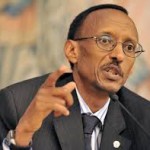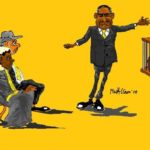
On November 19, 2003, the late Second Deputy Prime Minister and Minister for Foreign Affairs, James Wapakhabulo wrote to Museveni stating that a Referendum could not determine the term limit issue.
This was just before deliberations to amend the Constitution, to pave the way for lifting of the two-five year terms. However, despite Wapakhabulo penning a lengthy legal argument, Parliament amended the Constitution, lifting the term limits. It is said, at the time, the NRM MPs were each given Shs5 million, something many Ugandans have persistently described as a ‘bribe’.
Below is Wapa’s letter;
Your Excellency, I am putting my views in writing regarding this matter because I was not able to attend Cabinet in Soroti this morning. The reason was that my Ministry was not able to finance the trip and find a suitable vehicle to travel to Soroti and back.
Last time I endeavoured to travel to Soroti in an old Mercedes Benz but it broke down near Mbale and it has been in the garage since.
Minister wrong
Regarding the above-mentioned article, I wish to disagree right from the outset with the advice the Minister of Justice and Constitutional Affairs is rendering to Cabinet. Her advice on page 9 of her paper is that Article 105 (2) being unentrenched would be repealed through a Referendum held under Article 255 of the Constitution.
If taken, her advice would set up a fourth window through which to amend the Constitution. This is clearly unconstitutional because that would contravene Chapter 18 of the Constitution.
Chapter 18 of the Constitution is exhaustive on the question of amending the Constitution. It sets out only three ways through which the Constitution maybe amended. Under Article 259 of the Constitution, the power to amend certain provisions of the Constitution is shared between the Parliament and the population.
Under Article 260, the responsibility to amend the provisions of the Constitution relating to Local Government is shared between the Parliament and the District Councils. Under Article 261 Parliament is empowered to amend all the remaining provisions not mentioned under Article 259 and 260 by sitting alone and taking decisions that achieve not less than two-thirds absolute majority, i.e. of all Members of Parliament, on the second and third reading of the amending Bill.
On page 9 of her paper, the minister wrongly states that Article 105 (2) of the Constitution is not entrenched. Ordinarily, Parliament takes its decisions by simple majority, i.e. the majority of the members present and voting subject to the requirements of quorum. Article 105 (2), which requires two-thirds absolute majority, is in fact entrenched. There is no provision in our Constitution, which is not entrenched.
The power to repeal Article 105 (2) is therefore solely in the hands of the Parliament and cannot be swept aside whether by Referendum or otherwise.
It would appear her position has currency among some sections of government, and should therefore be dispelled right away.
When construing a legal document, more so the Constitution, the principle is that a particular provision on any matter excludes the general provision. Article 261 is found under the chapter, which deals solely with amendments to the Constitution and more particularly Article 261 contains exhaustive provision for amending Article 105(2).
In view of this, it is not necessary nor is it legally acceptable to seek assistance of a general provision under Article 255 of the Constitution which is found in chapter 17 that relates to general and miscellaneous provisions.
The Bill now before Parliament, The Referendum and other Provisions Bill, 2003 will not be of help here. The results of such Referendum held under that proposed law to determine the question whether Article 105 (2) should be repealed, even if favourable, has propaganda value only and nothing else.
Members of Parliament are not delegates. They are representatives.
Further more, courts will find it difficult to accept her line of approach for fear of its wider implications as far as the integrity and sanctity of the Constitution is concerned. For instance, can it be argued that because Article 126 (2) provides that judicial power derives from the people, therefore a referendum held under a law pursuant to Article 255 may sideline the jurisdiction of any court of law in the judicial system? Of course not.
There is yet another legal argument and I am avoiding buttressing my arguments with legal authorities and other legalese in the interest of communication. I am trying to keep my arguments as simple as possible. Constitutions are normally not amended indirectly.
Amending Constitution
A Constitution is amended directly through a law that is made for the sole purpose of amending the Constitution.
The United Kingdom where their Constitution is not written is the only exception to this rule. An Act of the British Parliament may be enacted without reference to an existing law and the existing law shall be deemed to have been amended, including amendments to their constitutional arrangements, i.e. the two laws are read together, and in case of conflict, Parliament shall be taken to have changed its mind, and the provisions of the new law will apply.
Otherwise in the rest of the Commonwealth jurisdictions, Uganda included, it is a requirement that the Constitution is amended textually, i.e. law is drafted setting out the provisions that have to be amended, making it very clear that it is a law that is made for the sole purpose of amending the Constitution.
This is what Article 258 (2) of our Constitution seeks to capture. The rationale behind this rule is that a constitution is a summary statement of the rights and obligations of the citizens and must be clear on all issues at a given time so that the citizen is at all times fully aware of his or her obligations and rights.
In fact in some countries such as Australia, this requirement is extended to taxation laws so that a law made in Australia to impose a tax cannot deal with any other matter except the imposition of a single tax, e.g. a law to impose wholesale tax is not the same law that imposes a retail sales tax.
Contention
It is my considered view that courts will find it difficult to accept that through indirect means, by way of a Referendum held under a law, made pursuant to Article 255 of the Constitution, Article 105 (2) of the Constitution is repealed.
I spoke to the Solicitor General and expressed my concerns outlined above. His view was that since the repeal of Article 105 (2) has become so contentious, it was only right that other provisions of the Constitution such as Article 1 (1) (all power belongs to the people) and clause 1 (4) (providing for the right of the people to express their will and consent as to who shall govern them) are called in to resolve the issue.
This argument is misconceived. What is contentious is not the forum in which Article 105 (2) of the Constitution is to be repealed. What is contentious is whether it should be repealed at all.
In this case, it becomes a question of numbers. If you have the numbers in Parliament, you carry the day, if you do not have the numbers, too bad. My advice therefore is that we should look for numbers in Parliament and not resort to creative interpretation of the Constitution, which will later give grave complications. The approach being proposed will not, even if the results of the Referendum were successful, create certainty in the electoral process.
There are those who will say that through a referendum, Article 105(2) was repealed. There are those, on the other hand, who will maintain for the reasons given above and others that Article 105 (2) was not repealed.
They may seek to support their position through court action seeking an injunction at the time of nomination. Even if this were overcome and the nomination went ahead, nothing stops them renewing objections in the Supreme Court on the ground, among others, that a person who was not qualified to stand for election was allowed to stand. This will call for a wide-ranging review of the constitutionality of the elections, the outcome of which is difficult to foretell. This is apart from the destabilising effect, executive [versus] the judiciary that would ensue.
Two transitions
I tried in Cabinet to propose an approach, which would, in my view, leave us united in Parliament so that we can address the question of amending Article 105(2), but my proposal was dismissed immediately by some members of the cabinet.
My proposal was this: let us first concern ourselves with the establishment of the party. Let us carry out elections in the Party applying rules of internal democracy, from the grassroots to the top.
After the organs and structures of the Party are in place we would then address the question of who should be our flag bearer in the Presidential elections of 2006.
It is my submission that with proper guidance, the various organs of the Party shall come to the conclusion that it is not in the interest of the country to seek to undergo two transitions at the same time, namely change from the Movement to multiparty and also change at the top of management of the country. At that stage, we would make a strategic decision to address one transition at a time, namely from Movement to multiparty.
As a party united, we would then say, let us present our most successful and winning card, i.e. the incumbent President. It is at this point that we would be faced with the impediment arising from the provisions of Article 105 (2) of the Constitution.
Given our dominant position in Parliament and our unity achieved through discussions and internal democracy, I personally see no difficulty in maintaining that Parliament repeal or amend as required, Article 105(2) of the Constitution. There will be some dissenters but that is the time to apply Party discipline.
Finally, let me point out that I am making this presentation in good faith and I am motivated by the desire to see harmonious political development in the country and nothing more.







